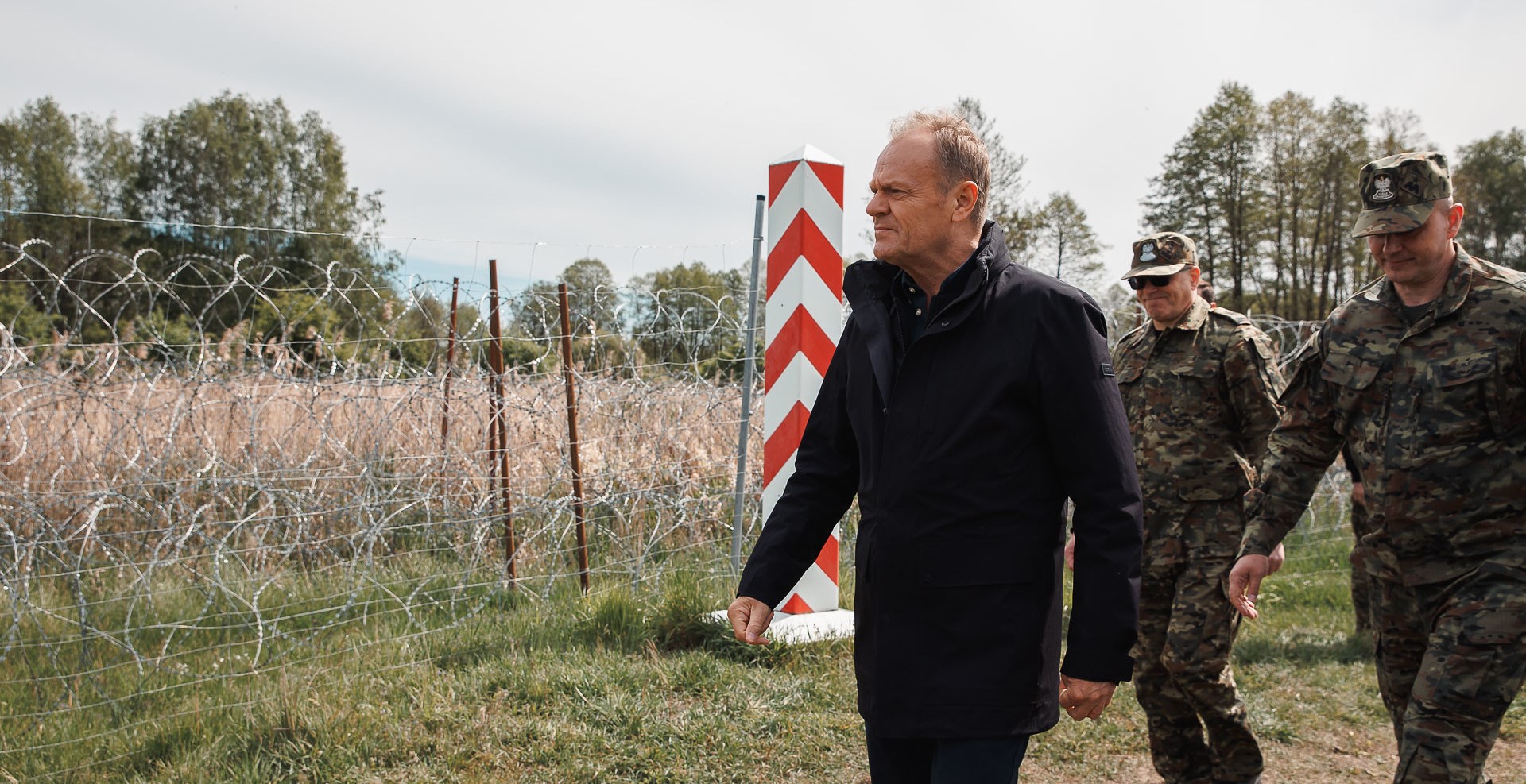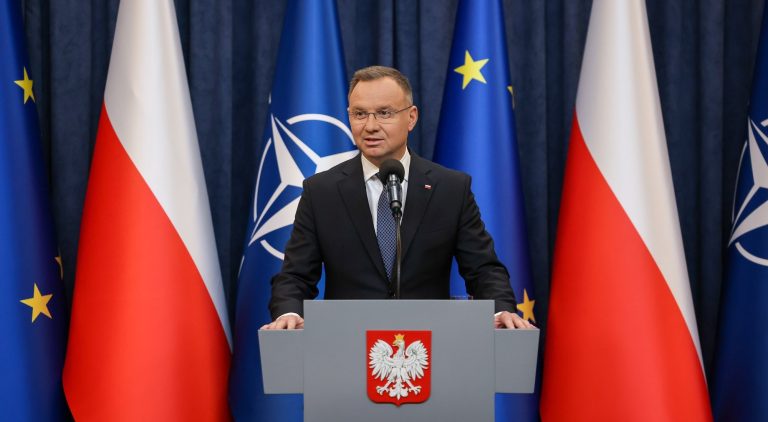Why did the Tusk government raise the migration issue?

Poland’s liberal-centrist prime minister’s proposed asylum ban was aimed at bolstering the ruling party’s security narrative ahead of next summer’s crucial presidential election.
But raising the salience of an issue where the government’s actions may not match its rhetoric is risky, and could also demobilise its more pro-immigration supporters.
Suspending asylum on the Eastern border
Last December, a new coalition government led by Donald Tusk, who was Polish prime minister between 2007-14 and then European Council President from 2014-19, was sworn in, ending the eight-year rule of the right-wing Law and Justice (PiS) party. Tusk is leader of the liberal-centrist Civic Platform (PO), which once again became the country’s main governing party.
The new coalition also includes the eclectic Third Way (Trzecia Droga) alliance – which itself comprises the agrarian-centrist Polish People’s Party (PSL), and the liberal-centrist Poland 2050 (Polska 2050) grouping formed to capitalise on TV personality-turned-politician Szymon Hołownia’s strong third place in the 2020 presidential election – and the smaller New Left (Nowa Lewica) party, the main component of a broader Left (Lewica) electoral alliance.
Last month, in a major speech to a PO party convention, Tusk announced a new government migration strategy. While most of the details were missing from his initial statement, Tusk highlighted a controversial plan to suspend the right “temporarily and territorially” for new arrivals in Poland to request asylum.
Poland will “temporarily suspend the right to asylum”, announced @donaldtusk in a speech outlining a tougher new migration strategy aimed at “regaining control and ensuring security”.
„I will demand recognition of this decision in Europe,” he added https://t.co/LJO1Nem1HE
— Notes from Poland 🇵🇱 (@notesfrompoland) October 12, 2024
Although Tusk did not explain how his idea would work, nor what he meant by “territorially”, he seemed to imply that asylum rights would be completely suspended. He later clarified that the measure would be targeted specifically at the crisis on Poland’s eastern border, which it has been grappling with for the last three years.
Tusk argued that the current rules were inadequate in a situation where people smugglers, orchestrated by the Belarusian authorities at the behest of their Russian ally, were exploiting the right to asylum to funnel large numbers of migrants from Africa, Asia and the Middle East illegally into Polish territory as part of efforts to destabilise the region.
He drew analogies with how Finland, another EU member, introduced a similar measure suspending asylum claims temporarily and allowing border guards to “push back” people crossing its border with Russia.
Recent months have seen a surge in attempted crossings over Poland’s border with Belarus as well as violence by migrants towards Polish officers.
Security expert @MPiekarski24 explains why the situation has changed and how the government is addressing it https://t.co/tYNT5eL9SZ
— Notes from Poland 🇵🇱 (@notesfrompoland) June 12, 2024
Tusk’s announcement triggered a wave of criticism from migrant rights activists who argued that suspending the right to asylum, even on a temporary basis, violated Poland’s international and EU treaty obligations, which were also enshrined in the country’s constitution.
He also faced dissent from within the governing coalition, especially from The Left, which said that it had not been consulted about the planned new strategy. Four left-wing government ministers filed dissenting opinions when the cabinet majority approved it.
Even PiS-aligned President Andrzej Duda used a speech to parliament to warn that the proposal could deprive Belarusian and Russian oppositionists fleeing repression for a safe haven.
Poland’s government has approved a tough new migration strategy that will include temporarily suspending the acceptance of asylum claims if „immigrants threaten to destabilise the state”
Four left-wing ministers voiced dissenting opinions against the plan https://t.co/xiCy3Qa052
— Notes from Poland 🇵🇱 (@notesfrompoland) October 15, 2024
The government’s supporters responded by saying that normal legal standards could not be applied on Poland’s eastern border, and that it would always prioritise Polish national security even if this clashed with humanitarian concerns and treaty obligations.
But they also argued that those with legitimate claims would still have access to the asylum procedure and that the measures were aimed specifically at those migrants sent deliberately by the Belarusian authorities to cross the border illegally, although the government did not provide details of how this distinction would be applied.
Tusk also said that there had not yet been any cases of Belarusian oppositionists attempting to cross the border illegally
Bolstering the ruling party’s security narrative
So why did Tusk choose to raise the migration issue in this way at this time?
Firstly, to overshadow a PiS congress held on the same weekend that was meant to revamp the party and provide it with new impetus ahead of the autumn.
Secondly, to distract from critical coverage of the first anniversary of the governing parties’ October 2023 parliamentary election victory, as many supporters of the Tusk administration were disappointed that it had failed to implement key election pledges.
Thirdly, Tusk was counting on the fact that he could claim a political victory by receiving approval for his new plan at an EU summit scheduled for later that week.
EU leaders were clearly prepared to cut a lot more slack to a figure closely aligned with the union’s political establishment than they would have if his PiS predecessor or another EU malcontent had made a similar proposal.
Poland has won EU approval for its plans to temporarily and partially suspend asylum rights, according to sources with knowledge of yesterday’s leaders’ summit in Brussels speaking to @POLITICOEurope
„I achieved what I wanted to achieve,” said @donaldtusk https://t.co/4KqgeBEBol
— Notes from Poland 🇵🇱 (@notesfrompoland) October 18, 2024
Tusk’s border policy gambit was also part of a broader effort to bolster support for whoever ends up as the PO candidate in next summer’s presidential election to succeed Duda; the result of a party primary election will be announced on 23 November.
The outcome of this election is critical because the government lacks the three-fifths parliamentary majority required to overturn a presidential veto. The migration issue could play a crucial role, particularly if it becomes linked to broader security concerns.
Polling suggests that security is one of the most important issues for Polish voters and, although Tusk was heavily criticised by migrant rights advocates, his stance has broad public support.
An October poll conducted by the SW Research agency for Rzeczpospolita, for example, found that 49% of respondents supported suspending the right to asylum temporarily, while only 24% were against.
Tusk is also well aware of how potentially dangerous the migration issue can be for his party. It played an important role in PiS’s victory in the 2015 parliamentary election, which was held at the peak of that year’s European migration crisis.
PiS, at the time the main opposition party, lambasted the PO-led government for agreeing to admit 6,200 migrants as part of an EU-wide scheme for the compulsory relocation of mainly Muslim migrants from the Middle East and North Africa.
In the run-up to last year’s parliamentary election, PiS once again tried to make this a central issue, taking aim at the EU’s new migration pact which included a mechanism requiring that countries accept a quota of “irregular” migrants or make solidarity payments of €22,000 per migrant not accepted.
In the event, PO turned the tables on PiS by pointing out that, during its eight years of rule, it had overseen Poland’s largest-ever immigration wave, including from “unsafe” Muslim-majority countries.
Poland is already a country of mass immigration, but politicians have been reluctant to acknowledge it.
The last week has seen the start of a much-needed debate on how the country should respond to its new reality, writes @danieltilles1 https://t.co/566KjU7kd0
— Notes from Poland 🇵🇱 (@notesfrompoland) October 17, 2024
Tusk’s party denounced riots in French migrant communities and ran a campaign advert with dramatic music and voiceover alongside pictures of African and Asian immigrants.
PiS was also knocked off-balance by allegations that it was embroiled in a fraud scandal involving Polish consular officials in developing countries processing work visa applications at an accelerated pace and without proper checks through intermediary companies in exchange for bribes.
Many commentators felt that one of the reasons that Tusk and his allies won the election was because they were able to outflank PiS on this issue.
Since taking office, PO has continued to take a tough rhetorical approach to migration, of which the proposal to seal off the Polish-Belarusian border to asylum seekers was only the latest example.
The “brutal truth” is that the “survival of Western civilisation” depends on preventing “uncontrolled migration”, says Polish Prime Minister @donaldtusk.
„We [must] wake up and understand that we have to protect our borders…[or] our world will collapse” https://t.co/mPwGIMCoU9
— Notes from Poland 🇵🇱 (@notesfrompoland) February 12, 2024
This steady hardening of migration policy also fitted with Tusk’s campaign narrative in the run-up to June’s European election, when he portrayed his government as the main guarantor of Polish security, with a particularly strong focus on the Eastern border.
The government reinstated a military exclusion zone along the border initially implemented by PiS in 2021 and pledged to strengthen physical defences and electronic surveillance systems. It also relaxed the rules governing the use of firearms by border guards after one of them was stabbed by migrants in June.
Only pretending to be tough?
The EU’s response to Tusk’s proposed asylum ban reflected a broader shift among centrist governments towards a highly sensitive political issue that has powered an increase in electoral support for right-wing conservative and radical right parties across the continent.
Tusk is clearly in the camp of those who argue that tougher migration policies are required to fend off this challenge. However, critics argue that there is a risk that this approach simply legitimises PiS’s argument that uncontrolled migration from predominantly Muslim countries undermines Polish security.
It thereby raises the salience of an issue on which the Tusk government’s actions may not match its rhetoric and the opposition will always be able to outflank it.
Indeed, PiS accused PO of only pretending to be tough on the border issue. It argued that, as European Council President, Tusk was one of those responsible for the EU’s loose migration policies and had threatened the PiS government with sanctions for opposing the compulsory migrant relocation scheme.
Police have denied a claim by conservative opposition leader Jarosław Kaczyński that “migrants are breaking into apartments and occupying empty buildings” in parts of Warsaw.
The interior minister has accused him of seeking to “spread fear” https://t.co/pKE1vxh2Pt
— Notes from Poland 🇵🇱 (@notesfrompoland) October 19, 2024
PiS pointed out that PO had criticised the previous government for constructing the border wall and cited examples of prominent party figures who interfered with the work of border patrols.
Tusk once referred to those crossing the border not as bandits but as desperate people looking to find their place in the world. To check whether he genuinely wanted to tackle the issue, PiS called upon Tusk to support its call for a referendum denouncing the EU migration pact.
Tusk’s supporters argued that he had always advocated a tougher line on the border issue than others in his party and that his latest pivot was a continuation not a break with his previous stance.
Although Tusk signalled sympathy for the plight of migrants, he also expressed disapproval of PO deputies who had travelled to the Polish-Belarusian border.
The party’s concerns with the border wall were, they said, related to its alleged high costs and lack of transparency in the tender processes. They argued that Tusk had opposed the EU migration pact and said that Poland would not accept relocated migrants.
„Poland will not accept illegal migrants” under the EU’s proposed migration pact, which includes a relocation mechanism, says PM @donaldtusk.
„We will not accept a single migrant. Poland will never be part of such a mechanism” https://t.co/3Xov85mVN2
— Notes from Poland 🇵🇱 (@notesfrompoland) January 4, 2024
Nonetheless, questions remain over the legality and feasibility of Tusk’s proposed asylum ban. He has a record of making headline-grabbing announcements which are then not followed through; for example, when he called for the chemical castration of paedophiles or launched a campaign against narcotic “afterburners” (dopalacze).
Tusk clearly banks on the fact that Poles have short political memories, and up until now has been proven right. But his tough statements on border control could come back to haunt him if his government does not deliver.
Demobilising pro-immigration voters?
Another risk is the possible backlash that Tusk could provoke among voters who adopt a more liberal “open borders” approach to asylum and immigration.
The Polish political scene is deeply polarised with little evidence of any significant voter transfers between the two large blocs, so electoral competition revolves primarily around the extent to which each side can mobilise and demobilise their supporters and opponents.
For sure, winning a presidential election requires securing more than 50% of the votes, so successful candidates need to go beyond simply mobilising their core electorates.
In fact, most Poles – including PO (and even a majority of Left) voters – actually favour a restrictive approach to migration. Tusk probably hoped that the negative reaction of migrant rights groups would actually reinforce his tough border control message.
However, although they are a minority, to win the presidential election, PO also needs these “open borders” voters to actually turn out and vote for them. If migration becomes a salient issue, and these voters do not see how the current government is different from its predecessor, they may decide to simply sit the presidential election out.
Tusk is clearly calculating that, however angered they may be by his asylum policy pivot, this group are so anti-PiS that they will end up voting for the PO candidate regardless.
Notes from Poland is run by a small editorial team and published by an independent, non-profit foundation that is funded through donations from our readers. We cannot do what we do without your support.

Aleks Szczerbiak is Professor of Politics at the University of Sussex. The original version of this article appeared here.
Main image credit: Krystian Maj/KPRM (under CC BY-ND-ND 2.0)






